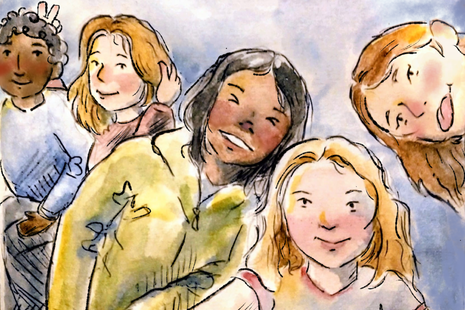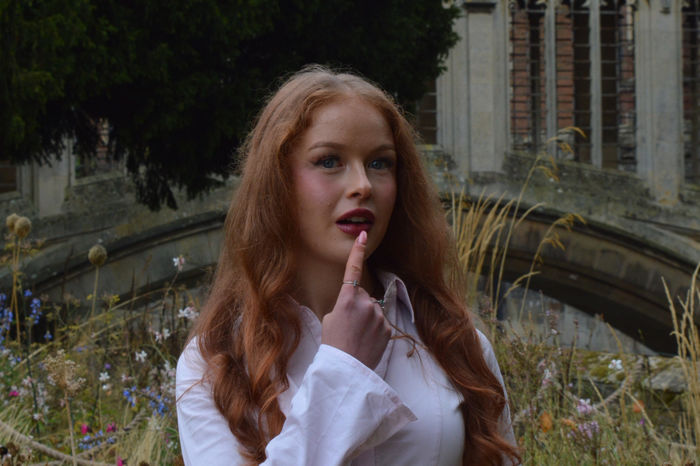The art of adult friendships
Robin Zubek shares her best tips and tricks for navigating the tumultuous world of adult friendships

My dad always said it’s harder to make close friends when you’re older. I never believed him – until I switched sixth forms and realised solidifying friendships really was much harder than the bonds forged by loom bands in year 6.
While we’re all technically rent-paying, laundry-doing, dish-washing adults now, we haven’t quite finished maturing. There’s no handbook for making friends in adulthood – most of us struggle to communicate clearly, and many are too scared to try. Worst of all, we sometimes act in completely bizarre, counterintuitive ways. For example, a friend told me that they barely spoke to me during freshers’ week because they “thought I was cool”. Excuse me? Who does that? When I think someone’s cool, I latch on like a barnacle… is that not normal?
Everyone handles friendship differently. How can you tell if someone is avoiding you because they literally can’t stand you, or because they’re intimidated by you? Is an “I can’t make it” text code for “please stop inviting me” or just… a genuine apology for not being able to come along?
“Flakiness is often just called being human”
I used to assume the worst: if someone isn’t responding, they must hate me. After all, as the saying goes: if they wanted to, they would. My (non-responsive, chronically late) best friend set me straight. She told me that this is what her best looked like, and I just had to trust her when she said that she cared. Sure enough, as her mental health improved, she was able to put more effort into friendships, and now her love is unmistakeable: it shines through her very actions.
Nowadays, I try to ask my friends for clarification on confusing behaviour, trusting that they’ll be honest with me – but this can backfire. It’s often seen as confrontation rather than curiosity. And when I’m the flaky one, people assume the worst and consider it a symptom of my apathy towards them. I understand being irritated, but I wish it wasn’t considered reflective of how much I care. Flakiness is often just called being human, and not being someone’s top priority during highly stressful times (like exams, big projects, family issues) doesn’t mean you’ve been forgotten. Maybe they just can’t think about anything else at that time – our brains can reach max capacity.
“Maybe you dissect feelings like a therapist, while they’re emotionally constipated”
Then there’s the fact that the older we get, the more everyone seems to know exactly who they are, what they like, and what they don’t. They know what kinds of friendships work for them, and you weren’t there while they discovered it. In some ways, it’s easier. You get a fully-formed person thrown your way, and you just have to decide if you like them. You don’t have to worry so much about whether they will grow in a completely opposite direction to you – you can see where they’re going already.
But it’s still hard to judge someone from just a few interactions. Superficially, you may have lots in common. Maybe you have similar interests, go to similar events and hang around in similar circles. As the connection deepens, it’s easy to suddenly realise that your approaches to friendship clash. Maybe you dissect feelings like a therapist, while they’re emotionally constipated. Maybe you could talk about movies and books all day, and they prefer to gossip about and psychoanalyse other people. Maybe you prefer a major catch-up where you talk for hours every few weeks, while they prefer endless hangouts, even if they pass in comfortable silence.
“Tell people you like them! Admit you want to hang out!”
It’s especially difficult if the way that you conceptualise ‘closeness’ is completely different. You think it’s a surface-level connection, until they call you their bestie. Or – worse – you think you’re pretty close until they complain that they “have no close friends”. Ouch.
So what’s the solution? I think we should all decide that honesty is in. If we were authentically ourselves, and expressed our true feelings towards others, then it would be easier to find our people. Tell people you like them! Admit you want to hang out! Importantly, no one will be disappointed to find out our true nature if we just let it show from the beginning.
No one can mind-read. We should show interest in those around us, and appreciate when others show interest in us. If our feelings are dismissed, then that’s not right, so let’s learn to accept when a relationship is just not right for us. If our kindness is seen as a weakness, let’s pity those with that worldview. And, when our trust is broken by one person, we should allow ourselves to trust again.
It’s easier said than done. Most of us haven’t had compassionate, empathetic communication modelled by those around us growing up. Many of us have had our trust broken so severely that it feels impossible to trust again. But we have to try, because it’s the only way that true connection (the kind that’s there for you, survives long-distance, and forgives your worst flakiness) can blossom.
 News / Colleges charge different rents for the same Castle Street accommodation2 March 2026
News / Colleges charge different rents for the same Castle Street accommodation2 March 2026 News / News in Brief: waterworks, wine woes, and workplace wins 1 March 2026
News / News in Brief: waterworks, wine woes, and workplace wins 1 March 2026 News / Angela Merkel among Cambridge honorary degree nominees27 February 2026
News / Angela Merkel among Cambridge honorary degree nominees27 February 2026 News / Climate activists protest for ‘ethical careers policy’1 March 2026
News / Climate activists protest for ‘ethical careers policy’1 March 2026 News / King’s hosts open iftar for Ramadan3 March 2026
News / King’s hosts open iftar for Ramadan3 March 2026









